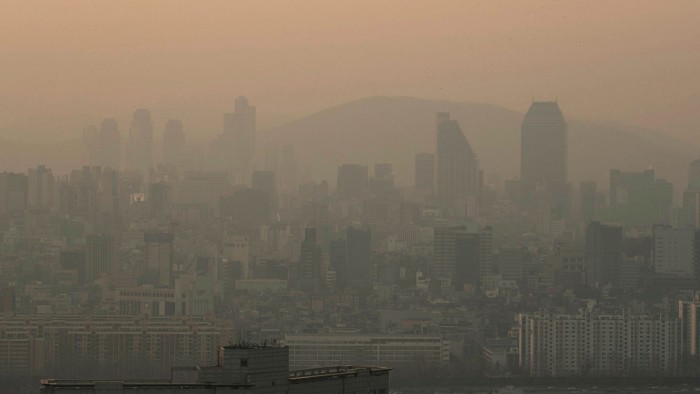South Korea fund managers look to cut ties with coal

Roula Khalaf, Editor of the FT, selects her favourite stories in this weekly newsletter.
South Korea’s biggest asset managers have indicated they will step back from funding the country’s coal industry, a win for global investors and activist groups that have pushed local corporates to cut ties with fossil fuels.
The 10 firms, which include Hanwha, KB Asset Management and Shinhan BNP Paribas, have said they will not invest in the Won4.9tn ($4.5bn) Samcheok Blue Power plant in Gangwon province. It is expected to be the final new coal power project built in the Asian nation.
The pledge comes after President Moon Jae-in in October promised that Korea would achieve carbon neutrality by 2050 and spend Won8tn on environmentally-friendly growth initiatives. But many Korean manufacturers have found it hard to shift away from fossil fuels because of their heavy dependence on coal.
The Korea Beyond Coal campaign — a network of civic and environmental groups — asked the country’s biggest 30 asset managers if they planned to buy bonds that would be issued to fund the plant’s construction. The 10 firms, which collectively manage about $180bn in bonds, said they would not.
Samsung Asset Management, Korea’s largest fund manager, declined to take a position on the project but pointed to last month’s pledge by the conglomerate’s financial units to stop investing in new coal projects, including via bonds and insurance underwriting.
The declaration by the 10 fund firms, which manage nearly 70 per cent of the country’s Won530tn bond market, could impair the financing of Samcheok Blue Power. Industrial groups Posco E & C and Doosan Heavy Industries & Construction began building the plant last year, but it still needs about $730m to complete construction. It plans to raise the shortfall by issuing bonds over the next three years.
It is estimated that Samcheok Blue Power will emit about 390m tonnes of greenhouse gases during its lifetime, assuming it is finished by 2024 and has a 30-year lifespan. That alone could cancel out Seoul’s Green New Deal plan, which seeks to reduce greenhouse gases by 12.3m tonnes by 2025.
“Once the plant begins operations, these reduction efforts will go to waste,” said Park Jee-hye, campaign director of Korea Beyond Coal.
Activists have called for the project to be cancelled, citing its significant environmental and financial risks. Solar power is expected to become cheaper than coal in Korea as early as next year.
Coal financing remains a problem in the country. Financial companies have funnelled $55bn into coal-fired power projects since 2009, including $23bn via corporate bonds.
Korea, the world’s 12th largest economy, is the seventh-largest carbon emitter. It derives just 5 per cent of its electricity from renewables, the lowest proportion of any OECD country, according to International Energy Agency data.
Twice weekly newsletter

Energy is the world’s indispensable business and Energy Source is its newsletter. Every Tuesday and Thursday, direct to your inbox, Energy Source brings you essential news, forward-thinking analysis and insider intelligence. Sign up here.
Comments